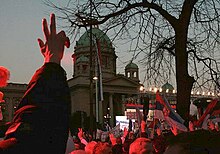
Serbia and Montenegro, known until 2003 as the Federal Republic of Yugoslavia, FR Yugoslavia or simply Yugoslavia, was a country in Southeast Europe located in the Balkans that existed from 1992 to 2006, following the breakup of the Socialist Federal Republic of Yugoslavia. The country bordered Hungary to the north, Romania to the northeast, Bulgaria to the southeast, North Macedonia to the south, Croatia and Bosnia and Herzegovina to the west, and Albania to the southwest. The state was founded on 27 April 1992 as a federation comprising the Republic of Serbia and the Republic of Montenegro. In February 2003, it was transformed from a federal republic to a political union until Montenegro seceded from the union in June 2006, leading to the full independence of both Serbia and Montenegro.

Yugoslavia was a country in Southeast and Central Europe which existed from 1918 to 1992.

The United Nations Interim Administration Mission in Kosovo (UNMIK) is the officially mandated mission of the United Nations in Kosovo. The UNMIK describes its mandate as being to "help the United Nations Security Council achieve an overall objective, namely, to ensure conditions for a peaceful and normal life for all inhabitants of Kosovo and advance regional stability in the Western Balkans."

The Yugoslav Wars were a series of separate but related ethnic conflicts, wars of independence, and insurgencies that took place in the SFR Yugoslavia from 1991 to 2001. The conflicts both led up to and resulted from the breakup of Yugoslavia, which began in mid-1991, into six independent countries matching the six entities known as republics which previously comprised Yugoslavia: Slovenia, Croatia, Bosnia and Herzegovina, Montenegro, Serbia, and North Macedonia. Yugoslavia's constituent republics declared independence due to unresolved tensions between ethnic minorities in the new countries, which fuelled the wars. While most of the conflicts ended through peace accords that involved full international recognition of new states, they resulted in a massive number of deaths as well as severe economic damage to the region.

The Kosovo Force (KFOR) is a NATO-led international peacekeeping force in Kosovo. Its operations are gradually reducing until Kosovo's Security Force, established in 2009, becomes self-sufficient.

After a period of political and economic crisis in the 1980s, constituent republics of the Socialist Federal Republic of Yugoslavia split apart, but the unresolved issues caused a series of inter-ethnic Yugoslav Wars. The wars primarily affected Bosnia and Herzegovina, neighbouring parts of Croatia and, some years later, Kosovo.
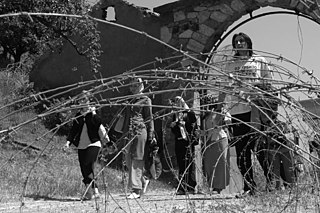
The 2004 unrest in Kosovo was the worst ethnic violence in Kosovo since the end of the 1998–99 conflict. The violence erupted in the partitioned town of Kosovo Mitrovica, leaving hundreds wounded and at least 14 people dead. The unrest was precipitated by reports in the Kosovo Albanian media which falsely claimed that three Kosovo Albanian boys had drowned after being chased into the Ibar River by a group of Kosovo Serbs. UN peacekeepers and NATO troops scrambled to contain a raging gun battle between Serbs and Albanians. Serbs call the event the March Pogrom, while the Albanians call it the March Unrest.
The anti-bureaucratic revolution was a campaign of street protests by supporters of Serbian leader Slobodan Milošević that ran between 1988 and 1989 in Yugoslavia. The protests overthrew the government of the Socialist Republic of Montenegro as well as the governments of the Serbian provinces of Vojvodina and Kosovo, and replaced them with allies of Milošević, thereby creating a dominant voting bloc within the Yugoslav presidency council.
The 2008 Kosovo declaration of independence, which proclaimed the Republic of Kosovo to be a state independent from Serbia, was adopted at a meeting held on 17 February 2008 by 109 out of the 120 members of the Assembly of Kosovo, including the Prime Minister of Kosovo, Hashim Thaçi, and by the President of Kosovo, Fatmir Sejdiu. It was the second declaration of independence by Kosovo's Albanian-majority political institutions; the first was proclaimed on 7 September 1990.

The Autonomous Province of Kosovo and Metohija, commonly known as Kosovo and abbreviated to Kosmet or KiM, is an autonomous province defined by the Constitution of Serbia that occupies the southernmost part of Serbia. The territory is the subject of an ongoing political and territorial dispute between Republic of Serbia and the partially recognised Republic of Kosovo, the latter of which has control over the territory. Its claimed administrative capital and largest city is Pristina.

The 2008 unrest in Kosovo followed Kosovo's declaration of independence on February 17, 2008. Some Kosovo Serbs opposed to secession boycotted the move by refusing to follow orders from the central government in Pristina and attempted to seize infrastructure and border posts in Serb-populated regions. There were also sporadic instances of violence against international institutions and governmental institutions, predominantly in North Kosovo.

Russia–Serbia relations are the bilateral foreign relations between the Russian Federation and the Republic of Serbia. The countries established official diplomatic relations as the Russian Empire and Principality of Serbia in 1816. Russia has an honorary consulate and embassy in Belgrade, and a liaison office to UNMIK, the capital of the disputed territory of Kosovo. Serbia has an embassy in Moscow, an honorary consulate in St. Petersburg and has announced to open a consulate-general in Yekaterinburg.
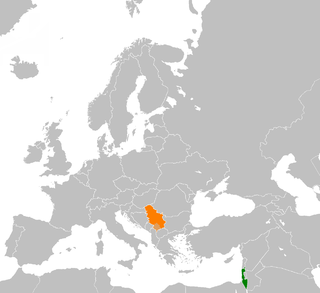
The diplomatic relations between Israel and Serbia were established on January 31, 1992, when Serbia was part of FR Yugoslavia. Israel has an embassy in Belgrade and Serbia had an embassy in Tel Aviv. Yugoslavia was the second country in Europe to recognize Israel in 1948. The two countries have economic and cultural ties, helped by a sizable community of Jews from the former Yugoslavia in Israel. Serbia agreed to move its embassy to Jerusalem on 4 September 2020 but decided not to after Israeli recognition of Kosovo as a sovereign state.
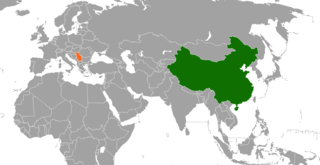
China-Serbian relations are foreign relations between the People's Republic of China and the Republic of Serbia. Relations have been maintained since SFR Yugoslavia's recognition of PR China on October 1, 1949, while diplomatic relations between the two countries were formally established by the exchange of diplomatic notes between the two Foreign Ministers on January 2, 1955. China has an embassy in Belgrade and also maintains an office in Priština based on consent of the Government of Serbia from November 2006. Serbia has an embassy in Beijing and a consulate-general in Shanghai. In 2017, Serbia and China mutually abolished the requirement of obtaining an entry visa for its citizens.
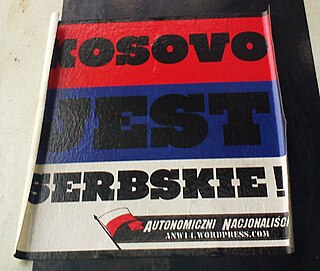
"Kosovo is Serbia" is a slogan that has been used in Serbia since the 1980s, later popularized as a reaction to Kosovo's 2008 declaration of independence from Serbia.

Slobodan Milošević was a Serbian and Yugoslav politician who was the president of Serbia from 1989 to 1997 and president of the Federal Republic of Yugoslavia from 1997 until his оverthrow in 2000. Formerly a high-ranking member of the League of Communists of Serbia (SKS) during the 1980s, he led the Socialist Party of Serbia from its foundation in 1990 until his death in 2006. Milošević played a major role in the Yugoslav Wars. During his reign, numerous anti-government and anti-war protests took place, and hundreds of thousands deserted the Milošević-controlled Yugoslav People's Army, leading to mass emigration from Serbia. During the NATO bombing of Yugoslavia in 1999, Milošević was charged by the International Criminal Tribunal for the former Yugoslavia (ICTY) for war crimes in connection with the Bosnian War, the Croatian War of Independence, and the Kosovo War. He became the first sitting head of state to be charged with war crimes.

Serbia was involved in the Yugoslav Wars, which took place between 1991 and 1999—the war in Slovenia, the war in Croatia, the war in Bosnia, and Kosovo. From 1991 to 1997, Slobodan Milošević was the President of Serbia. Serbia was part of the Federal Republic of Yugoslavia (FRY). The International Criminal Tribunal for the Former Yugoslavia (ICTY) has established that Milošević was in control of Serb forces in Bosnia and Herzegovina and Croatia during the wars which were fought there from 1991 to 1995.
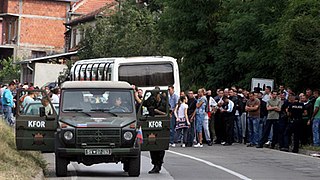
Clashes between the Republic of Kosovo and ethnic Serbs in northern Kosovo began on 25 July 2011 when the Kosovo Police crossed into the Serb-controlled municipalities of North Kosovo, to control several administrative border crossings. This was done without the Kosovo Police consulting either Serbia or Kosovo Force (KFOR)/EULEX. Though tensions between the two sides eased somewhat after the intervention of NATO's KFOR forces, they remained high amid concern from the European Union, which also blamed Kosovo for the unilateral provocation. On 19 April 2013, an agreement was signed in Brussels between representatives of Kosovo and Serbia. The 15-point document granted devolved powers to North Kosovo regarding economic development, education, healthcare and urban planning, and several mechanisms that allowed a certain autonomy in justice, policing and electoral matters.
In March and April 1981, a student protest in Pristina, the capital of the then Socialist Autonomous Province of Kosovo, led to widespread protests by Kosovo Albanians demanding more autonomy within the Socialist Federal Republic of Yugoslavia. The Presidency of Yugoslavia declared a state of emergency in Pristina and Kosovska Mitrovica, which led to rioting. The unrest was suppressed by a large police intervention that caused numerous casualties, and a period of political repression followed.
The First Agreement of Principles Governing the Normalisation of Relations, informally known as the Brussels Agreement, is an agreement to normalize relations between the governments of Serbia and Kosovo. The agreement, negotiated and concluded in Brussels under the auspices of the European Union, was signed on 19 April 2013. Negotiations were led by Serbian Prime Minister Ivica Dačić and Kosovo Prime Minister Hashim Thaçi, mediated by EU High Representative Catherine Ashton. The government of Serbia does not recognize Kosovo as a sovereign state, but began normalising relations with the government of Kosovo as a result of the agreement. In Belgrade, the agreement was criticized by protestors as a convalidation of Kosovo independence.

